- Home
- Patrick Rothfuss
The Name of the Wind tkc-1 Page 3
The Name of the Wind tkc-1 Read online
Page 3
That had been two span ago: twenty-two days. There had not been another serious trader since, even though this was the season for it. So despite the third levy tax looming large in everyone’s minds, people were looking in their purses and wishing they’d bought a little something, just in case the snow came early.
No one spoke of the previous night, of the thing they had burned and buried. Other folk were talking, of course. The town was alive with gossip. Carter’s wounds ensured that the stories were taken half seriously, but not much more than half. The word “demon” was being spoken, but it was with smiles half-hidden behind raised hands.
Only the six friends had seen the thing before it was burned. One of them had been wounded and the others had been drinking. The priest had seen it too, but it was his job to see demons. Demons were good for his business.
The innkeeper had seen it too, apparently. But he wasn’t from around here. He couldn’t know the truth that was so apparent to everyone born and raised in this little town: stories were told here, but they happened somewhere else. This was not a place for demons.
Besides, things were bad enough without borrowing trouble. Cob and the rest knew there was no sense talking about it. Trying to convince folk would only make them a laughingstock, like Crazy Martin, who had been trying to dig a well inside his own house for years now.
Still, each of them bought a piece of cold-wrought iron from the smith, heavy as they could swing, and none of them said what they were thinking. Instead they complained that the roads were bad and getting worse. They talked about merchants, and deserters, and levies, and not enough salt to last the winter. They reminisced that three years ago no one would have even thought of locking their doors at night, let alone barring them.
The conversation took a downward turn from there, and even though none of them said what they were thinking, the evening ended on a grim note. Most evenings did these days, times being what they were.
CHAPTER TWO
A Beautiful Day
It was one of those perfect autumn days so common in stories and so rare in the real world. The weather was warm and dry, ideal for ripening a field of wheat or corn. On both sides of the road the trees were changing color. Tall poplars had gone a buttery yellow while the shrubby sumac encroaching on the road was tinged a violent red. Only the old oaks seemed reluctant to give up the summer, and their leaves remained an even mingling of gold and green.
Everything said, you couldn’t hope for a nicer day to have a half dozen ex-soldiers with hunting bows relieve you of everything you owned.
“She’s not much of a horse, sir,” Chronicler said. “One small step above a dray, and when it rains she—”
The man cut him off with a sharp gesture. “Listen friend, the king’s army is paying good money for anything with four legs and at least one eye. If you were stark mad and riding a hobbyhorse down the road, I’d still take it off you.”
Their leader had an air of command about him. Chronicler guessed he had been a low ranking officer not long ago. “Just hop down,” he said seriously. “We’ll get this done with and you can be on your way.”
Chronicler climbed down from his horse. He had been robbed before and knew when there was nothing to be gained by discussion. These fellows knew their business. No energy was wasted on bravado or idle threats. One of them looked over the horse, checking hooves, teeth, and harness. Two others went through his saddlebags with a military efficiency, laying all his worldly possessions out on the ground. Two blankets, a hooded cloak, the flat leather satchel, and his heavy, well-stocked travelsack.
“That’s all of it, Commander,” one of the men said. “Except for about twenty pounds of oats.”
The commander knelt down and opened the flat leather satchel, peering inside.
“There’s nothing but paper and pens in there,” Chronicler said.
The commander turned to look backward over his shoulder. “You a scribe then?”
Chronicler nodded. “It’s my livelihood, sir. And no real use to you.”
The man looked through the satchel, found it to be true, and set it aside. Then he upended the travelsack onto Chronicler’s spread cloak and poked idly through the contents.
He took most of Chronicler’s salt and a pair of bootlaces. Then, much to the scribe’s dismay, he picked up the shirt Chronicler had bought back in Linwood. It was fine linen dyed a deep, royal blue, too nice for traveling. Chronicler hadn’t even had the chance to wear it yet. He sighed.
The commander left everything else lying on the cloak and got to his feet. The others took turns going through Chronicler’s things.
The commander spoke up, “You only have one blanket, don’t you Janns?” One of the men nodded. “Take one of his then, you’ll need a second before winter’s through.”
“His cloak is in better shape than mine, sir.”
“Take it, but leave yours. The same for you, Witkins. Leave your old tinderbox if you’re taking his.”
“I lost mine, sir,” Witkins said. “Else I would.”
The whole process was surprisingly civilized. Chronicler lost all of his needles but one, both extra pairs of socks, a bundle of dried fruit, a loaf of sugar, half a bottle of alcohol, and a pair of ivory dice. They left him the rest of his clothes, his dried meat, and a half-eaten loaf of incredibly stale rye bread. His flat leather satchel remained untouched.
While the men repacked his travelsack, the commander turned to Chronicler. “Let’s have the purse then.”
Chronicler handed it over.
“And the ring.”
“There’s hardly any silver in it,” Chronicler mumbled as he unscrewed it from his finger.
“What’s that around your neck?”
Chronicler unbuttoned his shirt, revealing a dull ring of metal hanging from a leather cord. “Just iron, sir.”
The commander came close and rubbed it between his fingers before letting it fall back against Chronicler’s chest. “Keep it then. I’m not one to come between a man and his religion,” he said, then emptied the purse into one hand, making a pleasantly surprised noise as he prodded through the coins with his finger. “Scribing pays better than I thought,” he said as he began to count out shares to his men.
“I don’t suppose you could spare me a penny or two out of that?” Chronicler asked. “Just enough for a couple of hot meals?”
The six men turned to look at Chronicler, as if they couldn’t quite believe what they had heard.
The commander laughed. “God’s body, you certainly have a heavy pair, don’t you?” There was a grudging respect in his voice.
“You seem a reasonable fellow,” Chronicler said with a shrug. “And a man’s got to eat.”
Their leader smiled for the first time. “A sentiment I can agree with.” He took out two pennies and brandished them before putting them back into Chronicler’s purse. “Here’s a pair for your pair, then.” He tossed Chronicler the purse and stuffed the beautiful royal-blue shirt into his saddlebag.
“Thank you, sir,” Chronicler said. “You might want to know that that bottle one of your men took is wood alcohol I use for cleaning my pens. It’ll go badly if he drinks it.”
The commander smiled and nodded. “You see what comes of treating people well?” he said to his men as he pulled himself up onto his horse. “It’s been a pleasure, sir scribe. If you get on your way now, you can still make Abbott’s Ford by dark.”
When Chronicler could no longer hear their hoofbeats in the distance, he repacked his travelsack, making sure everything was well stowed. Then he tugged off one of his boots, stripped out the lining, and removed a tightly wrapped bundle of coins stuffed deep into the toe. He moved some of these into his purse, then unfastened his pants, produced another bundle of coins from underneath several layers of clothes, and moved some of that money into his purse as well.
The key was to keep the proper amount in your purse. Too little and they would be disappointed and prone to look for more. Too much and th
ey would be excited and might get greedy.
There was a third bundle of coins baked into the stale loaf of bread that only the most desperate of criminals would be interested in. He left that alone for now, as well as the whole silver talent he had hidden in ajar of ink.
Over the years he had come to think of the last as more of a luck piece. No one had ever found that.
He had to admit, it was probably the most civil robbery he’d ever been through. They had been genteel, efficient, and not terribly savvy. Losing the horse and saddle was hard, but he could buy another in Abbott’s Ford and still have enough money to live comfortably until he finished this foolishness and met up with Skarpi in Treya.
Feeling an urgent call of nature, Chronicler pushed his way through the bloodred sumac at the side of the road. As he was rebuttoning his pants, there was sudden motion in the underbrush as a dark shape thrashed its way free of some nearby bushes.
Chronicler staggered back, crying out in alarm before he realized it was nothing more than a crow beating its wings into flight. Chuckling at his own foolishness, he straightened his clothes and made his way back to the road through the sumac, brushing away invisible strands of spiderweb that clung tickling to his face.
As he shouldered his travelsack and satchel, Chronicler found himself feeling remarkably lighthearted. The worst had happened, and it hadn’t been that bad. A breeze tussled through the trees, sending poplar leaves spinning like golden coins down onto the rutted dirt road. It was a beautiful day.
CHAPTER THREE
Wood and Word
Kote was leafing idly through a book, trying to ignore the silence of the empty inn when the door opened and Graham backed into the room.
“Just got done with it.” Graham maneuvered through the maze of tables with exaggerated care. “I was gonna bring it in last night, but then I thought ‘one last coat of oil, rub it, and let dry.’ Can’t say I’m sorry I did. Lord and lady, it’s beautiful as anything these hands have ever made.”
A small line formed between the innkeeper’s eyebrows. Then, seeing the flat bundle in the man’s arms, he brightened. “Ahhh! The mounting board!” Kote smiled tiredly. “I’m sorry, Graham. It’s been so long. I’d almost forgotten.”
Graham gave him a bit of a strange look. “Four month ain’t long for wood all the way from Aryen, not with the roads being as bad as they are.”
“Four months,” Kote echoed. He saw Graham watching him and hurried to add, “That can be a lifetime if you’re waiting for something.” He tried to smile reassuringly, but it came out sickly.
In fact, Kote himself seemed rather sickly. Not exactly unhealthy, but hollow. Wan. Like a plant that’s been moved into the wrong sort of soil and, lacking something vital, has begun to wilt.
Graham noted the difference. The innkeeper’s gestures weren’t as extravagant. His voice wasn’t as deep. Even his eyes weren’t as bright as they had been a month ago. Their color seemed duller. They were less sea-foam, less green-grass than they had been. Now they were like riverweed, like the bottom of a green glass bottle. And his hair had been bright before, the color of flame. Now it seemed—red. Just red-hair color, really.
Kote drew back the cloth and looked underneath. The wood was a dark charcoal color with a black grain, heavy as a sheet of iron. Three dark pegs were set above a word chiseled into the wood.
“Folly,” Graham read. “Odd name for a sword.”
Kote nodded, his face carefully blank. “How much do I owe you?” he asked quietly.
Graham thought for a moment. “After what ye’ve given me to cover the cost of the wood …” There was a cunning glimmer in the man’s eye. “Around one and three.”
Kote handed over two talents. “Keep the rest. It’s difficult wood to work with.”
“That it is,” Graham said with some satisfaction. “Like stone under the saw. Try a chisel, like iron. Then, after all the shouting was done, I couldn’t char it.”
“I noticed that,” Kote said with a flicker of curiosity, running a finger along the darker groove the letters made in the wood. “How did you manage it?”
“Well,” Graham said smugly, “after wasting half a day, I took it over to the smithy. Me and the boy managed to sear it with a hot iron. Took us better than two hours to get it black. Not a wisp of smoke, but it made a stink like old leather and clover. Damnedest thing. What sort of wood don’t burn?”
Graham waited a minute, but the innkeeper gave no signs of having heard. “Where would’e like me to hang it then?”
Kote roused himself enough to look around the room. “You can leave that to me, I think. I haven’t quite decided where to put it.”
Graham left a handful of iron nails and bid the innkeeper good day. Kote remained at the bar, idly running his hands over the wood and the word. Before too long Bast came out of the kitchen and looked over his teacher’s shoulder.
There was a long moment of silence like a tribute given to the dead.
Eventually, Bast spoke up. “May I ask a question, Reshi?”
Kote smiled gently. “Always, Bast.”
“A troublesome question?”
“Those tend to be the only worthwhile kind.”
They remained staring at the object on the bar for another silent moment, as if trying to commit it to memory. Folly.
Bast struggled for a moment, opening his mouth, then closing it with a frustrated look, then repeating the process.
“Out with it,” Kote said finally.
“What were you thinking?” Bast said with an odd mixture of confusion and concern.
Kote was a long while in answering. “I tend to think too much, Bast. My greatest successes came from decisions I made when I stopped thinking and simply did what felt right. Even if there was no good explanation for what I did.” He smiled wistfully. “Even if there were very good reasons for me not to do what I did.”
Bast ran a hand along the side of his face. “So you’re trying to avoid second-guessing yourself?”
Kote hesitated. “You could say that,” he admitted.
“I could say that, Reshi,” Bast said smugly. “You, on the other hand, would complicate things needlessly.”
Kote shrugged and turned his eyes back to the mounting board. “Nothing to do but find a place for it, I suppose.”
“Out here?” Bast’s expression was horrified.
Kote grinned wickedly, a measure of vitality coming back into his face. “Of course,” he said, seeming to savor Bast’s reaction. He looked speculatively at the walls and pursed his lips. “Where did you put it, anyway?”
“In my room,” Bast admitted. “Under my bed.”
Kote nodded distractedly, still looking at the walls. “Go get it then.” He made a small shooing gesture with one hand, and Bast hurried off, looking unhappy.
The bar was decorated with glittering bottles, and Kote was standing on the now-vacant counter between the two heavy oak barrels when Bast came back into the room, black scabbard swinging loosely from one hand.
Kote paused in the act of setting the mounting board atop one of the barrels and cried out in dismay, “Careful, Bast! You’re carrying a lady there, not swinging some wench at a barn dance.”
Bast stopped in his tracks and dutifully gathered it up in both hands before walking the rest of the way to the bar.
Kote pounded a pair of nails into the wall, twisted some wire, and hung the mounting board firmly on the wall. “Hand it up, would you?” he asked with an odd catch in his voice.
Using both hands, Bast held it up to him, looking for a moment like a squire offering up a sword to some bright-armored knight. But there was no knight there, just an innkeeper, just a man in an apron who called himself Kote. He took the sword from Bast and stood upright on the counter behind the bar.
He drew the sword without a flourish. It shone a dull grey-white in the room’s autumn light. It had the appearance of a new sword. It was not notched or rusted. There were no bright scratches skittering along its d
ull grey side. But though it was unmarred, it was old. And while it was obviously a sword, it was not a familiar shape. At least no one in this town would have found it familiar. It looked as if an alchemist had distilled a dozen swords, and when the crucible had cooled this was lying in the bottom: a sword in its pure form. It was slender and graceful. It was deadly as a sharp stone beneath swift water.
Kote held it a moment. His hand did not shake.
Then he set the sword on the mounting board. Its grey-white metal shone against the dark roah behind it. While the handle could be seen, it was dark enough to be almost indistinguishable from the wood. The word beneath it, black against blackness, seemed to reproach: Folly.
Kote climbed down, and for a moment he and Bast stood side by side, silently looking up.
Bast broke the silence. “It is rather striking,” he said, as if he regretted the truth. “But …” He trailed off, trying to find appropriate words. He shuddered.
Kote clapped him on the back, oddly cheerful. “Don’t bother being disturbed on my account.” He seemed more lively now, as if his activity lent him energy. “I like it,” he said with sudden conviction, and hung the black scabbard from one of the mounting board’s pegs.
Then there were things to be done. Bottles to be polished and put back in place. Lunch to be made. Lunch clutter to be cleaned. Things were cheerful for a while in a pleasant, bustling way. The two talked of small matters as they worked. And while they moved around a great deal, it was obvious they were reluctant to finish whatever task they were close to completing, as if they both dreaded the moment when the work would end and the silence would fill the room again.
Then something odd happened. The door opened and noise poured into the Waystone like a gentle wave. People bustled in, talking and dropping bundles of belongings. They chose tables and threw their coats over the backs of chairs. One man, wearing a shirt of heavy metal rings, unbuckled a sword and leaned it against a wall. Two or three wore knives on their belts. Four or five called for drinks.

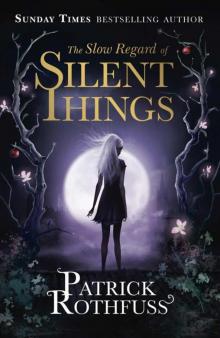 The Slow Regard of Silent Things
The Slow Regard of Silent Things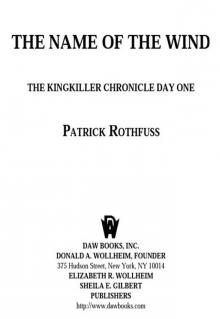 The Name of the Wind
The Name of the Wind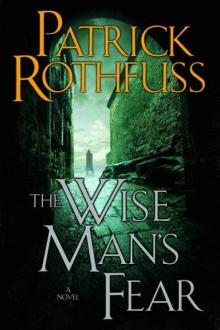 The Wise Man's Fear
The Wise Man's Fear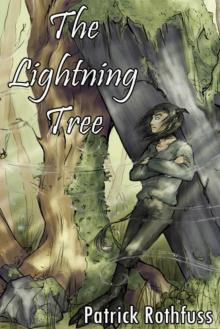 The Lightning Tree
The Lightning Tree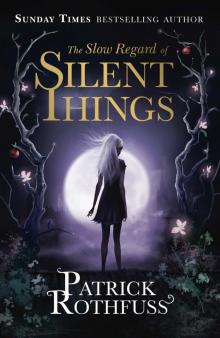 The Slow Regard of Silent Things: A Kingkiller Chronicle Novella (The Kingkiller Chronicle)
The Slow Regard of Silent Things: A Kingkiller Chronicle Novella (The Kingkiller Chronicle)![Kingkiller Chronicle [01] The Name of the Wind Read online](http://i1.bookreadfree.com/i/03/24/kingkiller_chronicle_01_the_name_of_the_wind_preview.jpg) Kingkiller Chronicle [01] The Name of the Wind
Kingkiller Chronicle [01] The Name of the Wind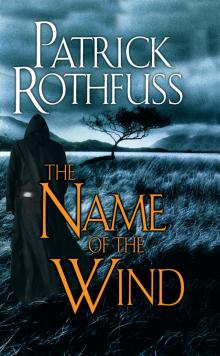 The Name of the Wind tkc-1
The Name of the Wind tkc-1